SAA Uganda organized Annual Stakeholders Meeting: Advancing Climate-Smart Farming in Uganda
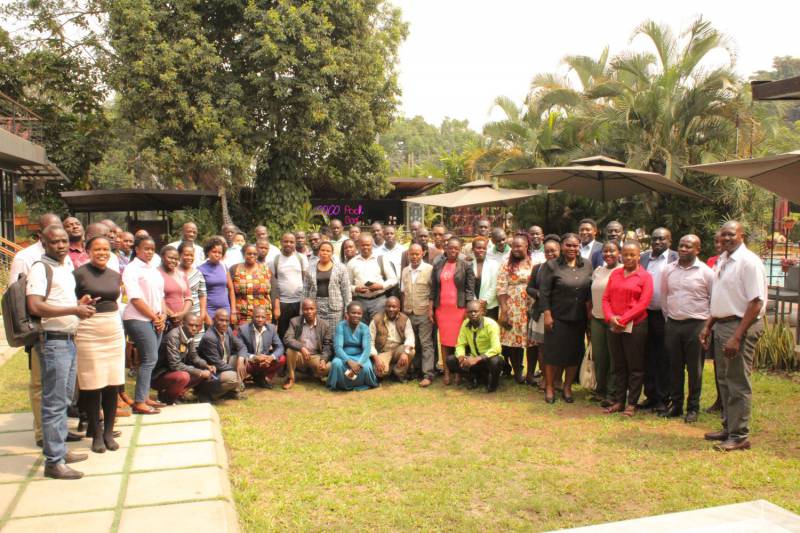
The Sasakawa Africa Association (SAA) in Uganda convened its Annual Stakeholders Planning Workshop on January 23, 2024, at the Fairway Hotel in Kampala, Uganda. The workshop, themed "Climate-Smart Mitigation for Income, Food, and Nutrition Security," aimed to foster robust discussions and collaborative planning to address the pressing challenges of climate change poses to agricultural productivity and livelihoods in Uganda.
The event saw participation from over 100 stakeholders across various sectors, including the public and private entities and development partners. Notable attendees included representatives from the Ministry of Agriculture, Animal Industry, and Fisheries (MAAIF), district officials and farmers across the region.
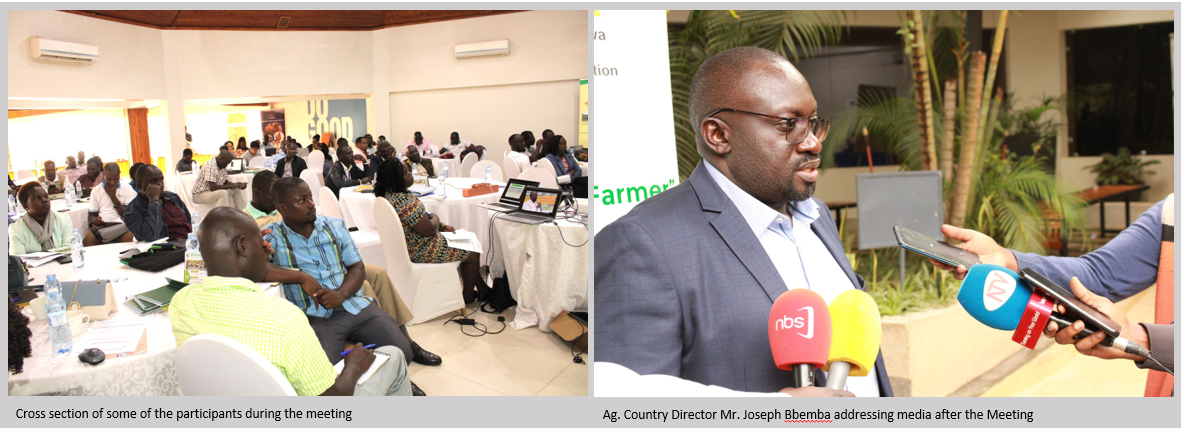
Mr. Joseph Bbemba, Acting Country Director, acknowledged the vital support of partners in enhancing the livelihoods of smallholder farmers. He highlighted SAA’s commitment to innovative agricultural extension through different models, such as Farmer Learning Platforms and CAT/Village Agent Models among others, designed to effectively convey essential messages to smallholder farmers.
In his address, Dr. Makoto Kitanaka, President of SAA, emphasized the organization's dedication to advancing agricultural knowledge and innovative technologies in line with Uganda's national development agendas such as Parish Development Model. He mentioned SAA’s efforts in bolstering its Monitoring and Evaluation systems and capacity-building for farmer groups, particularly focusing on One-Stop Center Associations (OSCAs) throughout 2023. For 2024, he promised intensified collaborations to further impact the lives of smallholder farmers.
Mr. Joseph Oke from MAAIF’s Directorate of Agricultural Extension spoke on the importance of collaboration in agricultural extension, urging partners to unite resources and knowledge to enhance the extension services. He highlighted the interconnectedness of agriculture, stating that supporting extension services benefits the entire agricultural value chain. He also addressed the challenge of climate change, advocating for action to adopt innovative technologies.
Commissioner Steven Tibejuka, representing the Permanent Secretary of MAAIF, highlighted the importance of strategic enterprise selection for guiding farmers toward both intensive and extensive agriculture. He encouraged SAA to help farmers choose enterprises that are income-generating, with a focus on seed breeding and the adoption of mechanization technologies. He also addressed issues of crop protection, contamination, and the role of insurance in agriculture. He reiterated the ministry's dedication to enhancing extension services, especially for households and farmer groups, by providing them with the necessary knowledge and skills to produce high-quality agricultural products suitable for international markets.
During the meeting, concerns were raised about the lack of knowledge among farmers and suppliers regarding the correct use of agrochemicals, which increases the risk of food contamination. The misuse of these essential chemicals, while aimed at reducing farm losses, presents dangers to farmers, the environment, and the acceptability of products in the market.
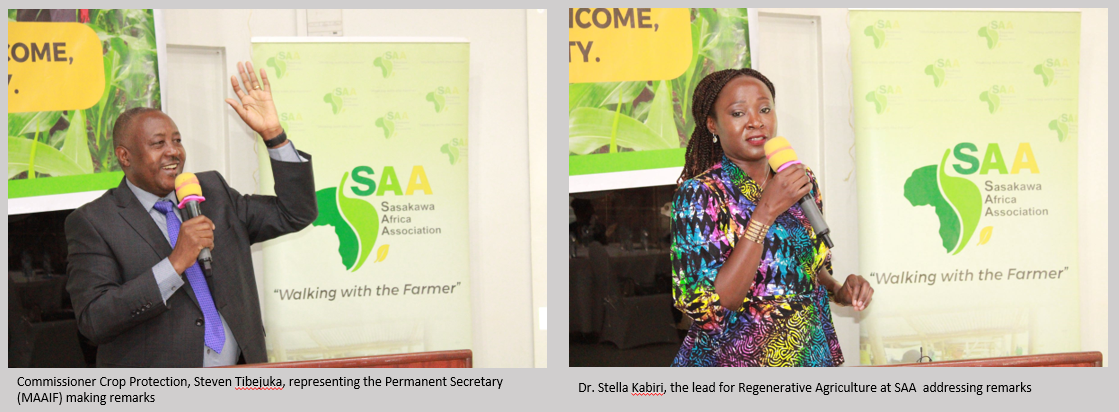
SAA’s 2023 achievements and operating plans for 2024 were presented.
Dr. Stella Kabiri, the lead for Regenerative Agriculture at SAA, underlined the importance of training farmers on the judicious use of agrochemicals. Speaking passionately about the organization's efforts, Dr. Kabiri highlighted its extensive outreach, reaching approximately 3 million farmers across Africa through various programs.
She also emphasized the importance of soil health and advocated for cost-effective regenerative agriculture practices. Dr. Kabiri offered practical advice for farmers, including intercropping, returning crop residues to the soil, and growing cover crops like pumpkins. She also recommended the use of natural materials like tree litter for mulching and utilizing anthills for water conservation, practices that bolster soil fertility and productivity while reducing dependency on agrochemicals for a more sustainable and eco-friendly agricultural system.
Musa Bugembe, a farmer from Kiboga District, commended the efforts of SAA for enhancing agricultural practices in his community. He noted a significant improvement in farmers' understanding of Good Agronomic Practices (GAPs) to produce high-quality agricultural products. However, he expressed frustration with the attitude of some fellow farmers who need continuous reminders about maintaining quality standards. He said, that through a culture of excellence and self-accountability, farmers can elevate the quality of their agricultural products, ultimately leading to increased profitability and sustainability.
The workshop concluded with a panel session addressing salient issues in agricultural extension, particularly focusing on resilient regenerative agriculture and nature-based Agri-production. Panelists emphasized the importance of supportive policy frameworks, capacity strengthening, strong partnerships, and leveraging digital systems for inclusive service provision.
In his closing remarks, Mr. Ande Okiror, Program Coordinator, Market Oriented Agriculture, thanked all participants for their active engagement in the workshop. He assured stakeholders that SAA would address identified opportunities and forge partnerships. He also pledged that SAA would regularly interface with partners to monitor progress and utilize lessons learned to improve SAA's interventions.
SAA-Uganda Featured on UBC-Uganda's public broadcast
SAA Publications
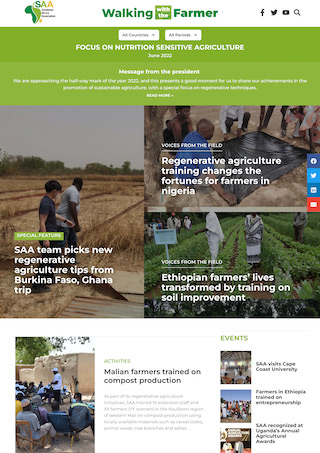
E-newsletter
"Walking with the Farmer"
SAA publishes a bimonthly e-newsletter reporting on SAA activities.
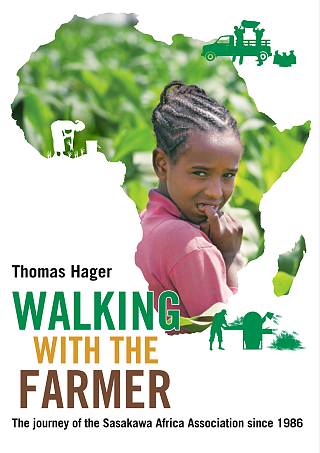
SAA history book
"Walking with the Farmer: The journey of the Sasakawa Africa Assoication since 1986"
This book chronicles the history of SAA from its inception to the present.

Annual Report
Annual Report FY2023
Annual Report FY2023 is available here.





